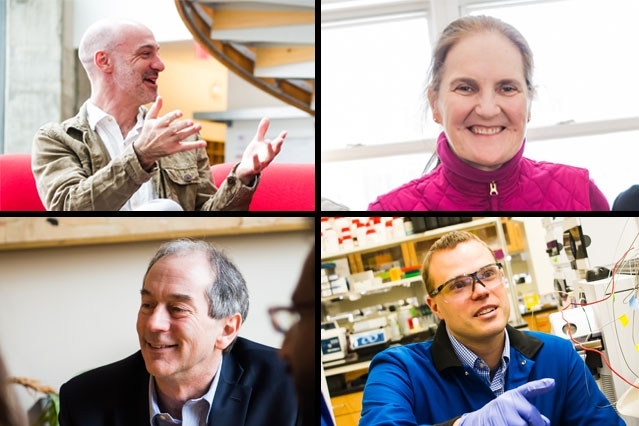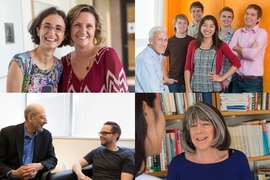It can be very easy for students to become overwhelmed in graduate school. The daily challenges of research, the pressure to reach academic milestones, and the management of life outside MIT can tax even the most well-organized mind. Although no student is alone in their cohort, reaching out to classmates or colleagues for help may be difficult exactly because everyone is likely experiencing the same struggles.
Faculty mentors, on the other hand, can offer graduate students authoritative beacons of hope. Understanding the rigors of graduate school, faculty mentors have the expertise and also the distance to provide perspective and to exemplify success after degree completion. Faculty mentors John Lienhard, Susan Murcott, Bradly Olsen, and Agustin Rayo have been honored by their students as "committed to caring" for affirming, inspiring, actively listening, and creating space for all students.
John Lienhard: Affirming students
Professor John Lienhard of the Department of Mechanical Engineering makes the members of his lab feel secure in their positions — and they are happier for it, according to his graduate students. In addition to fostering excellent advising practices, much of Lienhard’s research is “centered around those most in need,” specifically those vulnerable to water and food scarcity around the world.
The ability to demonstrate support and affirmation for his students has become a distinguishing feature of Lienhard’s success in mentoring. “Prof. Lienhard wrote me a kind email, gave me good comments for the things that were working well and encouraged me on the projects that were going behind schedule,” one student wrote. “His kindness helped me work harder and more effectively.”
When his students encounter an unforeseen obstacle, Lienhard offers perspective that encourages moving forward. “When I received a rejection notice from a journal,” one nominator wrote, “[Lienhard] took the time to reassure me that this happens … and that based on the reviewer’s comments, the value of the paper was still strong.”
Some of Lienhard’s students have developed their own excellent mentorship practices. “As a mentor of undergrads myself,” one nominator wrote, “I followed John's example in providing a warm and caring environment.” As a result, this nominator was honored with an Outstanding UROP Mentor Award.
Lienhard offers his students professional advice beyond academic research. “He gave me advice and encouragement in all of my endeavors,” one student noted, “whether or not they adhered to the traditional academic path.”
He practices informal advising (a Mentoring Guidepost identified by the Committed to Caring program). In group meetings, he initiates discussions with graduate students concerning many topics that extend beyond academia, including the importance of exercise, preparing for a career, and managing finances. Lienhard also emphasizes to his graduate students “the need to communicate ideas, through presentations and other interpersonal interactions.”
Susan Murcott: Inspiring learning and practice
Susan Murcott’s “passion, love, and dedication” to teaching and learning encourages her students not only to explore problems, but in their words, “carve our own path toward a solution.” A lecturer in MIT D-Lab, Murcott’s work contributes to the D-lab’s mission of designing and developing collaborative approaches and practical solutions to global poverty challenges.
Murcott not only wishes to attract students and collaborators from across disciplines, but also from outside of academia. She aims to build a diverse group of team members who offer a breadth of perspectives in other dimensions as well. “I am happiest when the composition of my team is multicultural, multi-generational, and of different ethnicities, genders, and disciplines,” she says.
After assembling her collaborators, Murcott says she tries to “cultivate a feeling in the classroom that we are a small community.” Students are encouraged to get to know one another personally so that they develop a sense of interest and belonging. Murcott prefers smaller classes so that she can get to know students individually and work with them on the “project-based, hands-on, action learning” that MIT D-Lab is known for.
This community feeling creates a judgment-free space for students to express their ideas. Murcott models understanding and listening skills, and in the words of one nominator “always takes people’s ideas and input seriously, and with grace.” This welcoming classroom environment (another Mentoring Guidepost identified by the C2C Program) nurtures confidence in students and provides them with the power to learn and grow.
Although battling the world’s water issues can easily become an all-consuming task, Murcott supports her students’ work/life balance with sensitivity to their other obligations and by monitoring how much time a given class should require. “I try not to overload students with work,” she says. “I want students to have a balanced life.”
Murcott recommends that students seek out mentors on campus who are caring, and whose work is of particular interest. “Don’t waste time,” she says. Students should choose mentors who are mentally present, and get to know them well.
Bradley Olsen: Creating space for everyone
Associate professor of chemical engineering Bradley Olsen recognizes that balancing life in graduate school is difficult. He notes that faculty members and graduate students share the same basic stressors, such as home responsibilities, deaths in the family, health concerns, and, of course, a lot of work. Olsen says that seeing faculty members as “fallible human beings like everyone else” can make it easier for graduate students to relate, and even see their own challenges reflected back to them.
Olsen encourages his students to approach him if they have any issues with research, classes, or grad school life more broadly. Whether or not things are going well, he actively schedules meetings with his graduate students to check in (another Mentoring Guidepost). In one instance when Olsen knew a student needed more support, his efforts to initiate follow-up meetings were deeply appreciated.
In the Olsen lab, graduate students and post-docs participate in small focus groups where a number of important topics are discussed, including mental health, women in science, and gender climate. During a group meeting on sexual harassment, Olsen encouraged the group to come up with ways to make MIT more welcoming to individuals who are victimized. “He also defined for us sexual harassment and how to recognize it,” the student said. This discussion provided an opening for lab members to explore ways to stop sexual harassment in our workplace and community.
Describing his own advising style, Olsen admits, “I sincerely wish I had a system, something with a catchy book-like title, but it’s really controlled chaos.” Olsen does his best to fulfill others’ expectations as well as his own. Along the way, he tries to be completely transparent about how things are going, and to apologize when necessary. His goal is continuous improvement and learning. “We do not aspire to be perfect, but we should always strive to grow,” Olsen says.
Agustin Rayo: Actively listening
Professor of philosophy Agustin Rayo’s concern for the mental health of his students is a direct result of his experience in their shoes. Particularly as an international student, Rayo says, “graduate school was rough, especially the first couple of years.”
Being away from his home country of Mexico was difficult for Rayo, and he often felt that he was academically behind his peers. “I was so stressed that I developed insomnia, which made everything worse,” he remembers.
Finding resources on campus, including MIT Mental Health and Counseling, made all of the difference for him. “I was in therapy throughout graduate school,” Rayo shares. “I'm not sure I would have made it to graduation without that kind of support.”
Keeping these experiences in mind, Rayo is quick to respond to any sign of poor mental health among his students. One advisee comments of Rayo, “I couldn't ask for a faculty member to take mental health issues in students more seriously.”
Rayo promotes work/life balance, a key component of mental health (and a Mentoring Guidepost). “I don't think I had a very good work/life balance until I got married,” Rayo says. “We now have a toddler and he is very good at ensuring that I don't neglect the 'life' part of my life!” Although marriage isn’t the only way to achieve balance, Rayo feels that prioritizing relationships and activities outside of MIT is an important step in the right direction.
When considering the department as a whole, Rayo places a high value on climate. Responding to a perceived issue in the department involving gender norms, he immediately scheduled meetings with the involved parties to ensure that all were heard and that every concern was addressed. “He made it clear that he supported us and valued our input,” one student says, “and worked with us to resolve the situation.”
One nominator emphasizes how seriously Rayo takes his role as a mentor. “I've never encountered a more caring, compassionate faculty member who was so dedicated to students' personal and academic wellbeing.”
Making graduate education more empowering
The Committed to Caring (C2C) program is an initiative of the Office of Graduate Education and contributes to its mission of making graduate education at MIT “empowering, exciting, holistic, and transformative.”
C2C invites graduate students from across MIT’s campus to nominate professors whom they believe to be outstanding mentors. Selection criteria for the award include the scope and reach of advisor impact on the experience of graduate students, excellence in scholarship, and demonstrated commitment to diversity and inclusion.
By recognizing the human element of graduate education, C2C seeks to encourage excellent advising and mentorship across MIT’s campus. More information about these and other C2C honorees and their advising practices may be found on the Committed to Caring pages.









